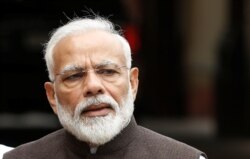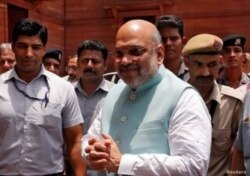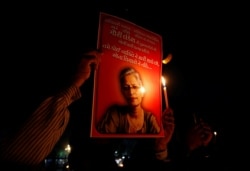For much of the 20th century, India's government wielded great power over journalists. Most media were state controlled, foreign media were blocked, and freedom of the press was curtailed.
In the late 1990s, however, as India began to modernize, journalism flourished. Controls were lifted, and TV news networks multiplied.
For investigative journalist Rana Ayyub, it was a blossoming of press freedom – and one that she worries will not last.
Ayyub is best known for her book Gujarat Files: Anatomy of a Coverup, an undercover investigation into the 2002 riots in India’s Gujarat province that killed more than 1,000 people, mostly Muslims. Narendra Modi, now India’s prime minister, was then the top official in Gujarat.
During a recent trip to Washington, Ayyub talked about the decline of press freedom in India, which journalism rights organization Reporters Without Borders now ranks as 140th out of 182 countries. India has drifted down in the rankings since Modi took power on a wave nationalism by the Hindu majority.
Ayyub told VOA that she has been victimized for her work, and that conditions for female journalists in India have become particularly difficult.
“There is a good deal of self-censorship in the Indian media right now because [journalists] are being targeted and they're losing their jobs for speaking out against the government,” she said.
Critics say Modi and his majority party have tolerated or condoned anti-Muslim violence. Most recently, the government orchestrated a communications blackout after Modi moved to revoke partial autonomy in Jammu and Kashmir, the country’s only Muslim-majority state.
“The second big problem that can get you in trouble is being a Muslim in India right now, because there is a majority in government that is almost making secondary class citizens of Muslims," said Ayyub, who is Muslim. “There are lynchings.”
Ayyub described one instance of such violence in a recent piece she wrote for Time magazine: A 24-year-old man, Tabrez Ansari, died after being severely beaten by a Hindu mob.
A video of the man being struck and begging for mercy went viral. The killing was condemned by the U.S. Commission for International Religious Freedom, which has named India a “country of particular concern” for ongoing attacks against non-Hindu or lower-caste Hindu minorities.
In her Time piece, Ayyub wrote that “some 90% of religious hate crimes in the last decade have occurred since Modi came to power.” At the same time, Modi had pledged to protect Indian minorities after his re-election to a second term in May, she wrote.
Going undercover
In 2002, three days of rioting broke out in Gujarat state after a Muslim mob attacked a train of Hindu pilgrims, 59 of whom died when one of the cars caught fire.
In the aftermath, Hindu mobs rampaged against Muslim homes, businesses and places of worship. An estimated 1,000 people or more died, most of them Muslims. The slaughter opened deep wounds of suspicion and accusation that continue to fester in India’s polarized political climate.
At the time, Modi, a Hindu, was chief minister of Gujarat. Critics maintained that he stood by as the anti-Muslim violence proceeded and failed to pursue those responsible. After years of delay, prosecutors in 2011 won convictions of 31 people for killing Muslims. For his part, Modi denied wrongdoing, and courts and a special task force never found evidence to prosecute.
In 2010, Ayyub had a big scoop while working for the magazine Tehelka. She’d obtained phone records and a state intelligence document linking the Gujarat home minister, Amit Shah, to police officers implicated in the killings of three Muslims who were falsely accused of terrorism.
Three weeks later, according to Ayyub's account, Shah became the first serving home minister to be arrested on charges of orchestrating the killings. He was acquitted after a trial in 2014 however, and now serves as Modi’s home affairs minister and head of the majority Bharatiya Janata Party.
Ayyub’s scoop loosened up more sources and suspicions. That in turn led to a life-changing decision, she recounts in her book.
“To cull the truth from individuals who were in a position of power and had chosen to seal the truth within themselves was not going to be easy,” she wrote. “The only way out before me was what every journalist in the pursuit of truth uses as a last resort. Go undercover.”
So Ayyub pretended to be a U.S. film student, using hidden cameras to record a series of conversations with Gujarat police and political officials – Modi among them – that raised new questions of culpability and accountability in the riots.
The transcripts, and her first-person account of the investigation, form the heart of Gujarat Files. The book became a best-seller and won accolades for Ayyub, including last year’s Most Resilient Global Journalist award delivered at the Peace Palace in the Hague.
Ayyub contends the transcripts implicate “some of the most powerful members of the state apparatus in Gujarat” in the 2002 rioting, but some reviewers have said that, while exposing revealing details, they add little to the overall understanding of what happened. According to Ayyub and press accounts, Modi and the BJP have chosen to ignore the book.
Y.P. Rajesh, managing editor of The Print in Delhi, told VOA the book remains controversial in part because of Ayyub’s use of hidden cameras and a false identity – practices that aren’t universally accepted in Indian journalism.
“All of this ended up raising questions about the book and its intentions although parts of it did corroborate findings of some official investigations,” Rajesh said. “In that sense, the jury is still out on the book.”
Threats to women journalists
Ayyub was 26 when she decided to report under false identity (“Maithili Tyagi, Independent Filmmaker, American Film Institute Conservatory”). She said reporting is harder for female journalists in India and Pakistan, where women are common targets of character assassination.
“I was under cover for eight months with eight cameras on my body. Then, after I published my investigation, I lost my job because anybody who hires me, you know, knows that the government will not like them," Ayyub told VOA. "So I've been rendered jobless for the last five years.”
After the book came out, Ayyub said she received death and rape threats online. Last year, someone on Twitter falsely quoted her as supporting child rapists and saying Muslims weren’t safe. Her phone number and address were posted online, as was a faked pornographic video.
In response, the United Nations Human Rights Office called on India to investigate and provide protection for Ayyub. The U.N. statement noted the 2017 murder of Indian journalist Gauri Lankesh, who’d also been threatened.
Ayyub was friends with Lankesh, who wanted to publish Gujarat Files in the Kannada language spoken in southwest India where she edited the newspaper Lankesh Patrike. Because Lankesh was embroiled in a lawsuit at the time, Ayyub suggested getting a different publisher.
Lankesh laughed and said, "Darling, I am stronger than these nincompoops," according to a according to a remembrance Ayyub published. Gunmen shot Lankesh in the chest and head outside her home on Sept. 5, 2017. Her weekly tabloid was known for its coverage of right-wing extremism.
The last message Ayyub received from Lankesh, sent shortly before her death, read: “Hang in there love.”
"I certainly do feel that the women journalists, should report the threats that they face every day,” Ayyub told VOA. “I do not dismiss them as being harmless because, I have seen many colleagues losing their lives by just dismissing the threats that come their way. If you are a woman journalist there is so much misogyny.”
Unfortunately, the kind of harassment Ayyub suffered is a global problem for female journalists, said Elisa Lees Munoz, executive director of the International Women's Media Foundation in Washington.
“We hear from women around the world – that might be Brazil, it might be Colombia it might be India – who think that this is just part of doing your job a day to day,” said Munoz. “And we do reject that notion wholeheartedly.”
Situation in Kashmir
Ayyub called the Modi government's latest effort to control news media in Indian Kashmir undemocratic and counter to the Indian constitution. For days, the government sealed off the Muslim-majority region, turning off communications to prevent news from getting in or out.
“You cannot clamp down on the Internet. You cannot shut down all television,” Ayyub maintained. "You cannot place a city under curfew and then take a decision about them. You cannot base the democratic leaders under arrest and then make a decision about them.”
Modi has justified the media and security crackdown on grounds that Kashmir’s previous status fueled a separatist movement and was unfair to minority groups.
Ayyub said the lack of news could lead to an even more perilous situation.
Despite the self-censorship and reprisals against female journalists, Ayyub remains hopeful about the potential for impact.
“This is the time to be a journalist. This is the time to shine,” she said. “Some of the biggest investigations in the country are being done by women and not men.”








